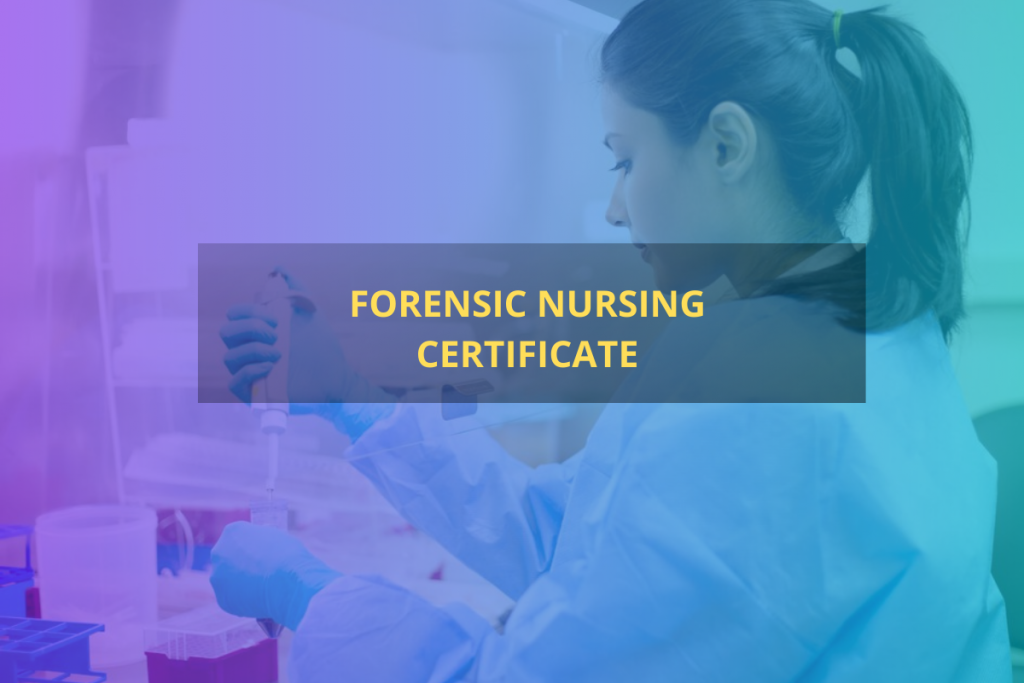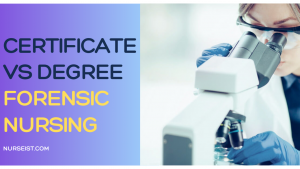You could be a nursing student or a nurse who has made a decision to pursue a career as a forensic nurse. But you are still undecided about whether you should pursue a forensic nursing degree first or a certificate to advance your career. Right?
Well, it may not be the toughest decision in career building, but of course, it’s a valuable decision that which program to pursue first and which one to pursue next. Here, You will get sufficient information on –
Which program to obtain your first? DEGREE OR CERTIFICATE? Which is more valuable?
What courses or credentials will advance your career in forensic nursing?
Which institutes offer the best online programs for forensic nurses?
Let’s get into it!
Forensic nursing is where legal systems and healthcare systems intersect.
Forensic Nurses are those who work primarily with crime victims. They also work for traumatic and sexual Victims. Forensic nurses’ major work is to collect medical data on the crime and prove the crime to the jurisdiction.
There is a major misconception in forensic nursing about “degree” & “certification”. Most nurses think the programs are kind of similar. But it’s totally wrong!
What Does A Forensic Degree Program Cover?
Forensic degree programs cover extra courses along with the main courses. A nurse will learn about other nursing fields like – Neonatal, ICU, and Hospice along with a Forensic course.
The degree program requires a long time and semesters to complete a nursing degree and become a nursing graduate. For example, RN take 2 years, BSN takes 4 years, and MSN degree in Forensic nursing takes 1.3 year minimum and 2 years minimum. If you need more ideas on graduate program type, cost, and length then check out our blog on “Graduate programs of forensic nursing“.
What is a Forensic Certificate?
Forensic certificate courses focus on forensic medical knowledge and nursing skills needed to work in a hospital or Forensic lab. Classes are covered based on the type of certificate topic.
The certificate program starts from beginner to advanced level. If you enroll in an advanced certificate course you will get more deeper knowledge into the particular subject you enroll for. You can obtain a nursing certificate by online courses or from any institution. It will take just a few months to have your certificate in your hand.
However, certificates bring extra value to your nursing career. You can take any nursing certificate after completing your nursing graduation or Degree program.
You must know a degree program is the major requirement in the nursing job market whether a certificate is just a supplement of an existing degree with a particular skill set. A Forensic Certificate will benefit you with advanced knowledge to get promoted in your job. On the other hand, a degree will help you find a forensic job.
Requirements for Forensic Nursing
There are some procedures to become a forensic nurse. After completing a graduate program you need to get a forensic license and some experience. You can choose these two paths to be a forensic nurse:
- Either to Obtain (MSN) in Forensic Nursing
- Or, have a Forensic Nursing Certificate
Only registered nurses with bachelor’s degrees in nursing are admitted to master’s degree programs in forensic nursing. These programs contain the majority of the coursework found in a certificate program, as well as extra classes in nursing theory, perpetrator care, criminal law, and clinical care, as well as clinical experience. The majority of programs need 36 credit hours. It’s possible that you’ll be able to enroll in an online program.
Many universities have certificate programs for forensic nurses to extend their knowledge in particular fields. Nursing students who complete the Forensic Nursing Certificate program learn how to collect forensic training, record forensic evidence, do lab tests, treat traumatic patients, treat sexual assault patients, collect and record forensic data, and interact with law informants, among other things. To fulfill some certificate credits, you’ll need 25 credit hours or more.
Forensic Nursing Certificate

Forensic nursing certificate programs can be done through any medical university that has a medical unit. The programs are frequently provided via 4-year institutions’ extension or continuing education departments and are intended for registered nurses or other qualified healthcare workers. The institution prepares nurses with the required knowledge they need and trains them on how to handle crime scenes.
Registered nurses as well as other healthcare professionals can apply for such certification if they meet the basic criteria the institution requires. Nursing students mainly learn from the program are:
- Identify and execute the procedures necessary to treat various types of trauma.
- Collect, sort, and preserve forensic evidence.
- Make immediate treatment arrangements for the victims on the spot.
- Foundations of Forensic Nursing
- Photographing a crime scene.
- Preservation of evidence.
- Dealing with violence.
- Collaboration with law enforcement and medical teams.
The practical courses include:
- Introduction to forensic science.
- Forensic approaches to firearm injury.
- Forensic approaches to domestic violence.
- Crime scene preservation.
- Courtroom testimony procedures.
- Forensic photography and healthcare.
- Criminology.
Master of Science (MSN) in Forensic Nursing

MSN in forensic nursing program is designed for students who are only interested in specializing in forensic activities. Only Registered nurses (RN) with a bachelor’s (BSN) degree are eligible to apply for this program.
MSN programs in the field include advanced courses in nursing practice, nursing theory, and clinical nursing. Moreover, they dig much deeper than forensic certificate programs.
All the students are taught with in-depth knowledge and experience. They have to complete all the forensic certificate program courses as well as advanced forensic courses. Students have the option to choose between a thesis or research project. Some advanced courses in the curriculum are –
- Nursing theory and research.
- Advanced clinical concepts.
- Forensic nursing and victim care.
- Forensic nursing and perpetrator care.
- Forensic nursing interventions.
- Introduction to criminal law.
The basic courses –
- Introduction to forensic science.
- Forensic approaches to firearm injury.
- Forensic approaches to domestic violence.
- Crime scene preservation.
- Courtroom testimony procedures.
- Forensic photography and healthcare.
- Dealing with violence.
- Sexual assault.
- Domestic violence.
- Evidence gathering.
- Victim interviewing strategies.
- Criminalistics.
- Pathophysiology.
- Criminology.
- Crime scene photography.
- Evidence Preservation
After graduation, many nurses work in clinics or hospitals to gather some experience. In that case, they don’t get enough time for MSN or earn an extra certificate. That is why many institutions offer online programs for nurses who want to establish their careers in forensic nursing. Let’s check the link below to know which top institutions offer online programs for forensic nurses:
“Best Institutions & Online Programs for Forensic Nurses.”
Which Credentials Can Bring Value In Forensic Career?
Now, You have already figured out the differences and you also know that certificates can bring extra value in your career. Let’s take a look at some professional credentials that can actually help you to advance your career in forensic nursing and promote your job position.
The Sexual Assault Nursing Examiner (SANE) is the most prevalent credential. SANE is mostly a medical forensic nursing specialist certificate program in Evidence Research and microbiological results. SANE mostly assists victims of sexual assault.
What are the requirements of SANE?
In order to become a SANE, you first need to satisfy the following requirements:
- Have more than two years of forensic nursing experience
- Professional and advanced physical assessment skills in the areas of emergencies, critical care, and maternal-infant health are required.
- Patients’ Physiological Health is well-understood.
- Have a thorough understanding of sexual assault and evidence collection and preservation.
How Long Does SANE Take?
The SANE-A is a certified course mainly designed to provide nurses knowledge on how to provide treatment to adult victims (age 18 plus.)
The SANE-P is another certified course that is designed to provide nurses training on how to handle a child victim case.
IAFN offers guidelines for SANE education. Sexual Assault Examiner Classes consist of 4 hours of classroom instructions and training. Sane certification is an average of 40 hours of clinical training.
SANE Certificate Validation
After three years, it will expire. Continuous education over a three-year period and an excellent score on the certification examination are required for renewal of the certification.
What are the advantages of SANE Certification?
The Value SANE Certificate will bring to your career
- SANE Degree holders are treated more faster to rape victims.
- A SANE Degree holder nurse has a strong sense of knowledge on evidence collection and provenance.
- SANE Degree provides a nurse higher conviction rate
- SANE practitioners establish strong collaborative relationships with lab instructors.
We hope that your confusion on the forensic nursing degree vs certification has been cleared now. You can choose the perfect institution or courses for you and even choose accurate medical certification to grow your career in forensic nursing.
We wish you good luck for your career. If you require any additional information from us, please leave a remark below so that we may provide you with appropriate suggestions.

Leave a Reply